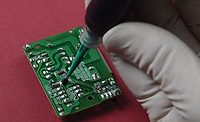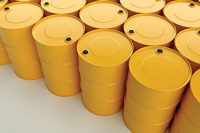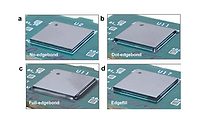Cool Customers: Premixed and Frozen Packages for Adhesives and Sealants
Premixed and frozen packages provide highly reliable convenience packaging for plural-component resins.

The PMF packager must control its process to provide the same flow rates and work lives for every PMF batch.



Premixed and frozen (PMF) refers to plural-component resin systems delivered in syringes and cartridges that are premixed and frozen in dry ice. PMF packages are convenient and reliable, with resins precisely weighed and mixed at the proper ratio, degassed, and flash frozen in a dry ice bath at -80˚C. Syringes from 1-55 cc are the most common PMF packages, but larger cartridges from 2.5-32 oz are also available, as are jars and cans.
After flash freezing, PMF packages are either packed in insulated containers with dry ice and shipped via expedited freight, or they are stored in -40˚C freezers for later shipment. The end user must have a -40˚C freezer available in order to store PMF packages for later production use.
Creating PMF Packages
In most cases, the flash freezing and minimum -40˚C storage retards the resin system’s chemical reaction for at least six months. The end user simply removes the PMF product from their -40˚C freezer and allows it to thaw for a specified period. The thawed syringe is then typically used to dispense small amounts of precisely mixed and air-free adhesives, sealants, coatings, or encapsulants in assembly operations.
The thawed resins are often applied using automated equipment, so their air-free nature and remaining work life after thawing are important. The customer must work with the PMF packager to determine:
- Optimum batch size to obtain needed work-life
- Optimum fill amount per package to minimize waste
- Correct amount of dry ice, given the transit time
- Thawing procedure that gives required flow for required work life
PMF processing also lends itself to modifications or enhancements to two-component epoxies, urethanes, silicones, and other reactive resin systems. It is easy to add a third or fourth ingredient during the mixing and degassing process. These additives can include adhesion promoters, pigments, fluorescent indicators, spacer beads, fumed silica to thicken the material, or solvents to thin the material.
Once all of these parameters are established, the PMF packager must control its process to provide the same flow rates and work lives for every PMF batch. The batch size must remain constant, with the time to mix, fill, and flash-freeze the packages not exceeding the specified time. This is called the mix-to-freeze time, which determines the flow rates and related work life of the PMF package for the end user.
In some cases, the syringe or cartridge must be centrifuged before freezing to eliminate entrapped air bubbles that may remain even after mixing under high vacuum (4 Torr). The PMF packager would need a resin system with a longer pot life or work life to allow for this additional centrifuging step.
In general, the longer the pot life, the better the PMF process; the longer pot life allows for mixing bigger batches and filling more packages per batch, reducing labor time and cost. Thinner, more flowable materials are also faster to mix, degas, and package, reducing costs and typically providing more work life or application time before it advances and gets too thick.
Receiving PMF Packages
It is important that receiving personnel are aware and trained to handle incoming PMF packages. The insulated box containing the dry ice and PMF packages will be marked as perishable, with bright warning labels noting the need to transfer to a -40˚C freezer upon receipt. Some dry ice should remain in the box to verify that the PMF material has not been exposed to temperatures over -40˚C.
Temperature monitors can be added to each box to further ensure the product has not been comprised. Low-cost electronic monitors can be read or downloaded to any computer using a USB port without special software. The PMF packager can also provide notification of a PMF shipment to alert receiving departments and make certain someone is available to properly receive the packages.
Thawing PMF Packages
It is recommended that PMF packages thaw naturally at room temperature with the dispense tips up. It is not recommended that the thawing process be accelerated by using ovens, hot air guns, or hot plates. However, a controlled process using mild heat in a warm water or bead bath can be successful in speeding up the thawing process.
PMF products must equilibrate to -40˚C prior to thawing at room temperature. It is recommended to store the products in a -40˚C freezer for a minimum of 24 hrs after receiving. The incoming PMF packages can arrive at closer to the -80˚C temperature of dry ice. If they are thawed directly from -80˚C to room temperature, there is a high probability of creating irreversible freeze/thaw air voids.
The thawing time is dependent on the mass of the PMF material and can vary from 5 min to 2 hrs. Excess moisture should be wiped off of the thawed PMF package. Once thawed, the product must be applied in the specified work life period, and then discarded. In most cases, the cured resin left in the package can be disposed of as non-hazardous waste. Leftover material should not be refrozen.
PMF Package Types
Most PMF packages are used for applying small amounts of adhesive or other resins in electronic assembly operations from syringes. They require precise application to bond or rigidize components, apply underfills, and glob top sealing or coating.
Larger PMF packages are also common. Two-component meter, mix, and dispense equipment can be used instead of batch mixing for PMF packages. Some aerospace assembly operations use larger amounts of mixed resin in relatively small spaces and need the reliability and ease of application the PMF package offers. Large reusable insulated bins and boxes can be used for economical expedited shipping of larger PMF packages.
The Ultimate Package
PMF packages provide highly reliable convenience packaging for plural-component resins. Due to their design, they are not subject to potential quality issues that arise with other types of packages, such as side-by-side cartridges that rely on static mixers to perform the mixing operations. Continued strong growth is expected because of this quality advantage, particularly given the tremendous expansion in electronics applications and the trend toward smaller circuit boards and components.
For more information, call (866) 322-8322 or visit www.kitpackers.com.
Looking for a reprint of this article?
From high-res PDFs to custom plaques, order your copy today!






